Daily Vocabulary Words: List of Daily Used Words in Leading International Newspapers
Hi there. Welcome to this special section @ Wordpandit.
Our endeavour here is very simple: to highlight important daily vocabulary words, which you would come across in leading newspapers in the country. We have included the following newspapers in our selection:
• The New York Times
• The Washington Post
• Scientific American
• BBC
• The Guardian
• Psychology Today
• Wall Street Journal
• The Economist
We are putting in extensive work for developing your vocabulary. All you have got to do is be regular with this section and check out this post on a daily basis. This is your repository of words that are commonly used and essentially, we are posting a list of daily used words. Hence, this has significant practical application as it teaches you words that are used commonly in leading publications mentioned above.
Visit the website daily to learn words from leading international newspapers.
WORD-1: Uncannily
CONTEXT: If all this feels uncannily like last January then there is one critical political difference.
SOURCE: Guardian
EXPLANATORY PARAGRAPH: If you’ve ever watched a cartoon where a character knows exactly what’s going to happen next, and it feels almost magical because it’s so surprising, that’s what “uncannily” is like. It means something is so surprising or strange that it seems like magic.
MEANING: In a way that is strange or mysterious, especially in an unsettling manner (adverb).
PRONUNCIATION: un-KAN-uh-lee
SYNONYMS: eerily, strangely, extraordinarily, weirdly, mysteriously
USAGE EXAMPLES:
1. She uncannily guessed the right answer to every question.
2. His ability to predict events was uncannily accurate.
3. The twins often have uncannily similar thoughts.
4. The resemblance between the old painting and her was uncannily striking.
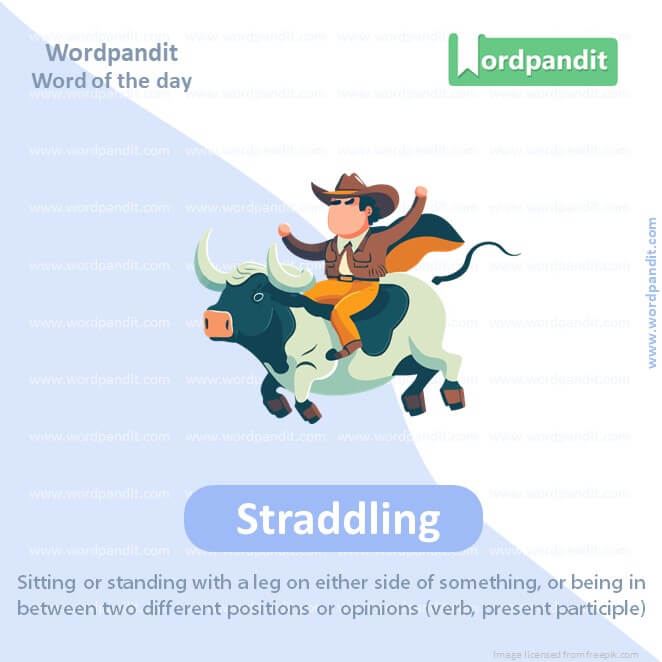
WORD-2: Straddling
CONTEXT: With a general election now on the horizon, MPs are starting to talk about the prospect of strikes straddling two administrations.
SOURCE: Guardian
EXPLANATORY PARAGRAPH: Imagine sitting on a bike with one foot on the ground on one side and the other foot on the ground on the other side. When you sit like this, you are “straddling” the bike. It means you are sitting or standing with your legs on each side of something.
MEANING: Sitting or standing with a leg on either side of something, or being in
between two different positions or opinions (verb, present participle).
PRONUNCIATION: STRAD-ling
SYNONYMS: spanning, bridging, bestriding, mounting, riding
USAGE EXAMPLES:
1. He was straddling the fence, unsure of which side to jump down to.
2. The river straddles the border between the two countries.
3. She was straddling the bike as she waited for the traffic light to change.
4. The project straddles both science and art disciplines.
WORD-3: Crumbling
CONTEXT: This strike seems to be about more than just pay or even the crumbling state of the NHS: it’s both more political and more fundamental than that.
SOURCE: Guardian
EXPLANATORY PARAGRAPH: Think about when you take a cookie and break it into small pieces; the cookie is “crumbling.” It means breaking into small pieces, especially when something old or not very strong breaks apart.
MEANING: Breaking or falling apart into small fragments, especially as part of a process of deterioration (verb).
PRONUNCIATION: KRUHM-bling
SYNONYMS: disintegrating, breaking, fragmenting, decaying, deteriorating
USAGE EXAMPLES:
1. The old wall was crumbling, with bricks falling out.
2. Due to lack of maintenance, the building is slowly crumbling.
3. She watched the cookie crumbling in her hand.
4. The empire was crumbling under pressures from within and without.
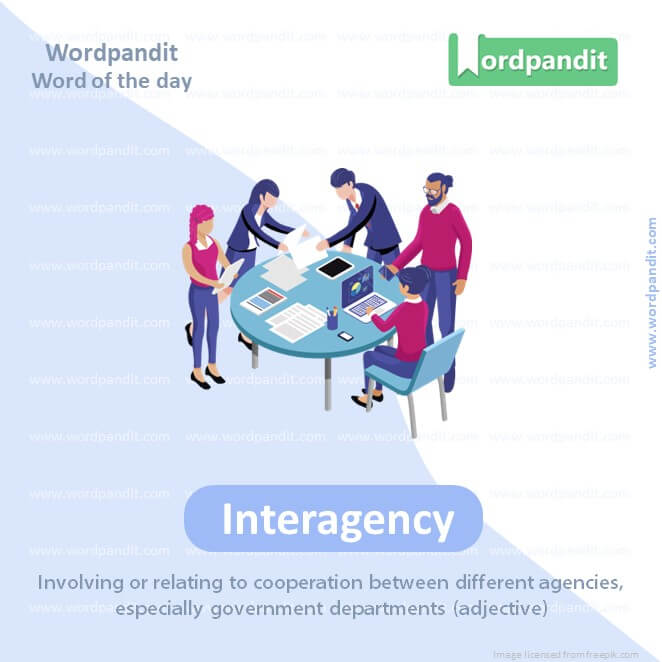
WORD-4: Interagency
CONTEXT: The District also approved more than $11 million to support the office of deputy mayor for public safety and justice, which will “develop and lead interagency public safety initiatives that improve the quality of life in the District.
SOURCE: Washington Post
EXPLANATORY PARAGRAPH: Think about when different people in your class work together on a big project, like when you make a big poster or a model. “Interagency” is like that but for grown-ups in different work places who come together to work on big things.
MEANING: Involving or relating to cooperation between different agencies,
especially government departments (adjective).
PRONUNCIATION: in-ter-AY-jen-see
SYNONYMS: collaborative, cooperative, multi-agency, joint, combined
USAGE EXAMPLES:
1. The interagency task force was created to address the crisis.
2. They held an interagency meeting to improve communication between departments.
3. An interagency agreement helped streamline the process.
4. Interagency cooperation is essential for successful policy implementation.
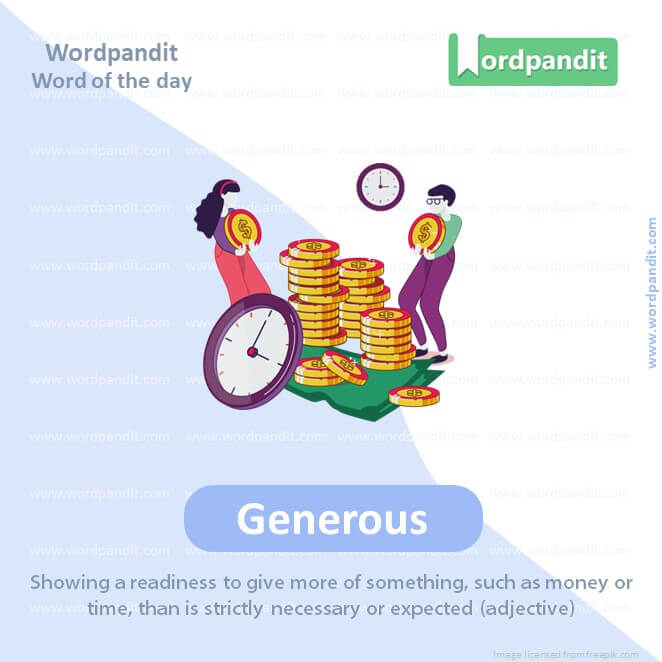
WORD-5: Generous
CONTEXT: Meanwhile shadow health secretary Wes Streeting is giving little sign that Labour would be more generous and must know that if he does, junior doctors will only be encouraged to wait this government out, with painful consequences for patients.
SOURCE: Guardian
EXPLANATORY PARAGRAPH: When someone shares their toys with you without you even asking, or gives you a big piece of cake, they are being “generous.” It means they like to give a lot to others, making them feel happy.
MEANING: Showing a readiness to give more of something, especially money or time, than is strictly necessary or expected (adjective).
PRONUNCIATION: JEN-uh-rus
SYNONYMS: charitable, benevolent, open-handed, bountiful, magnanimous
USAGE EXAMPLES:
1. She was generous with her time, always helping others.
2. He made a generous donation to the charity.
3. The company is known for its generous holiday bonuses.
4. They praised her generous spirit.
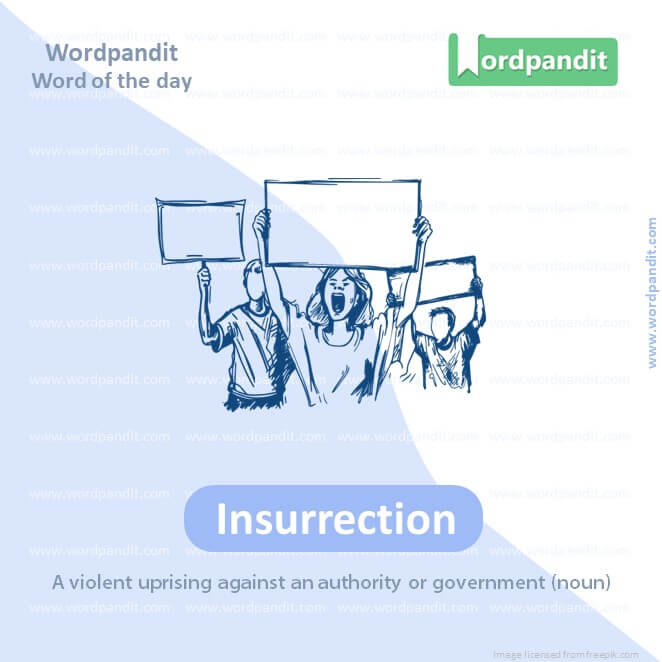
WORD-6: Insurrection
CONTEXT: A Post-University of Maryland poll published this week shows a sizable share of Americans accept lies about the 2020 election and the insurrection that followed on Jan. 6, 2021.
SOURCE: Washington Post
EXPLANATORY PARAGRAPH: Imagine a group of people in a story who are very unhappy with the rules and decide together that they want to change them. They might try to take over a castle or a city to make new rules. This is called an “insurrection.” It’s like a big, serious argument where people try to change who is in charge.
MEANING: A violent uprising against an authority or government (noun).
PRONUNCIATION: in-suh-REK-shun
SYNONYMS: rebellion, revolt, uprising, mutiny, revolution
USAGE EXAMPLES:
1. The insurrection was quelled by the troops stationed in the capital.
2. Historical records tell of an insurrection that changed the course of the kingdom.
3. The leader of the insurrection was captured and imprisoned.
4. They studied the causes of the insurrection in their history class.
WORD-7: Endangered
CONTEXT: His reckless words endangered my family and everyone at the Capitol that day.”
SOURCE: Washington Post
EXPLANATORY PARAGRAPH: Think about your favorite animal. If there are not many left in the world, and it’s hard for them to find food or a safe place to live, we say they are “endangered.” It means they need help to make sure they don’t disappear from the Earth.
MEANING: Seriously at risk of extinction (adjective).
PRONUNCIATION: en-DAN-jerd
SYNONYMS: threatened, at risk, vulnerable, imperiled, in danger
USAGE EXAMPLES:
1. The endangered species act protects animals like tigers and elephants.
2. Many organizations work to save endangered animals.
3. The panda has been an endangered species for many years.
4. Conservation efforts are crucial for helping endangered plants and animals.
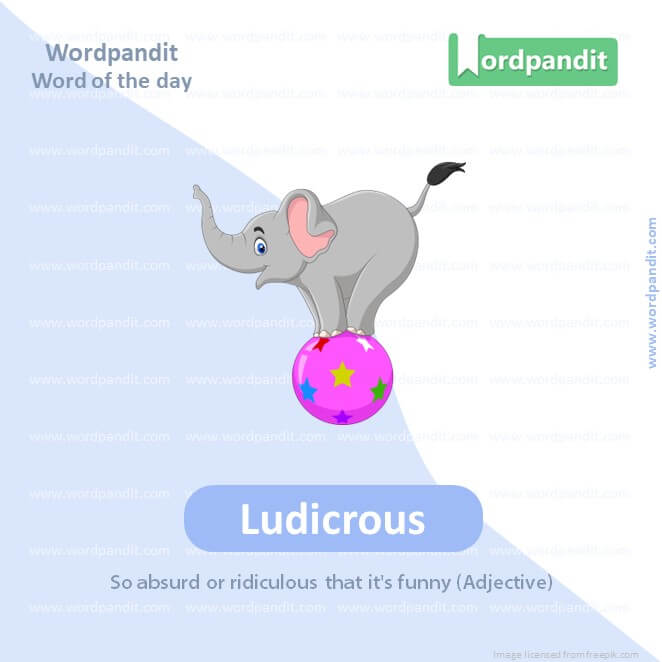
WORD-8: Ludicrous
CONTEXT: FBI Director Christopher A. Wray, a Republican appointed by Mr. Trump, has testified categorically and under oath that there’s nothing to the “ludicrous” conspiracy theories that his agency played any role in urging people into the Capitol.
SOURCE: Washington Post
EXPLANATORY PARAGRAPH: If someone told you that a tiny kitten could lift a big car, you might laugh because it sounds so silly and impossible. That’s what “ludicrous” means. It’s when something is so silly or unbelievable that you just have to laugh.
MEANING: So absurd or ridiculous that it’s funny (Adjective).
PRONUNCIATION: LOO-di-kruhs
SYNONYMS: ridiculous, absurd, preposterous, laughable, farcical
USAGE EXAMPLES:
1. The idea of a flying car seemed ludicrous to people a hundred years ago.
2. He dismissed the ludicrous notion of a sunken city being ruled by fish.
3. The charges against her were so ludicrous that the judge had to laugh.
4. The movie’s plot was ludicrous but entertaining.
WORD-9: Perilously
CONTEXT: Much-needed operations and appointments have been cancelled and rotas ripped up to provide a bare minimum of emergency care for the six days of the strike, but things are stretched perilously thin.
SOURCE: Guardian
EXPLANATORY PARAGRAPH: Imagine walking very close to the edge of a high cliff where it could be dangerous if you’re not careful. That’s being “perilously” close, which means being in a situation where there is a lot of danger.
MEANING: In a way that is full of danger or risk (adverb).
PRONUNCIATION: PEHR-ih-lus-lee
SYNONYMS: dangerously, hazardously, precariously, riskily, unsafely
USAGE EXAMPLES:
1. She was perilously close to falling off the ledge.
2. The boat navigated perilously through the stormy seas.
3. He lived his life perilously, always seeking adventure.
4. The old bridge swayed perilously under the weight of the traffic.
WORD-10: Splurging
CONTEXT: It begins with his splurging on a nifty new scent-blocking hunting outfit. It ends with him splattered in blood.
SOURCE: Washington Post
EXPLANATORY PARAGRAPH: Imagine you have a jar of cookies, and instead of eating just one, you decide to eat a lot of them all at once because it feels special. “Splurging” is when you treat yourself by spending a lot of money or using a lot of something, just because it feels good and fun.
MEANING: Spend money freely or extravagantly (verb).
PRONUNCIATION: SPLUR-jing
SYNONYMS: squandering, spending lavishly, indulging, treating oneself, going all out
USAGE EXAMPLES:
1. He decided to splurge on a new gaming console.
2. They splurged on a fancy dinner for their anniversary.
3. Splurging once in a while can feel rewarding.
4. During the holidays, many people splurge on gifts for their loved ones.
Vocabulary Sentence
The task of mastering language stretches beyond the realm of solitary words. It invites us to construct and comprehend a ‘vocabulary sentence’. This amalgamation of words into meaningful sentences adds layers to our linguistic prowess. However, effectively learning from a ‘vocabulary sentence’ requires some strategic insight. So, how should we approach it?
Firstly, when encountering a ‘vocabulary sentence’, it’s pivotal to comprehend the word in context. Deciphering its place and role in the sentence gives a deeper insight into the word’s meaning, usage, and nuances. This approach aids in firm retention and active application of words.
Another technique to master a ‘vocabulary sentence’ is to break it into manageable chunks. Look at each word, understand its function, and then put it all together to comprehend the sentence as a whole. This step-by-step dissection and understanding better cements the ‘vocabulary sentence’ into your learning.
Mimicking the prosody and rhythm of language while practicing ‘vocabulary sentence’ can also foster better learning. In this regard, listening to podcasts or watching videos in the target language can be exceptionally beneficial. They showcase real-life demonstrations of how words are strung together into sentences with correct stress patterns and intonations.
Lastly, crafting your own ‘vocabulary sentence’ with learnt words strengthens understanding and boosts recall. Be it during conversation or writing, actively using these sentences plays a key role in contextual learning.
In essence, unfolding a ‘vocabulary sentence’ is a treasure trove of learning opportunities. With proper understanding, breaking sentences into chunks, mimicking prosody, and actively crafting sentences, the journey of learning from a ‘vocabulary sentence’ becomes engaging and fruitful. Every sentence learnt and applied is a valuable catch in the linguistic sea!













